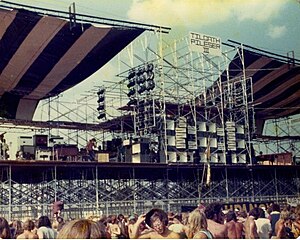Ozark Music Festival
This article needs additional citations for verification. (April 2008) |
| Ozark Music Festival | |
|---|---|
 | |
| Genre | Rock music, pop, etc. |
| Dates | July 19–21, 1974 |
| Location(s) | Missouri State Fairgrounds in Sedalia, Missouri |
| Founded by | Musical Productions Inc. (MPI) |
| Attendance | 350,000 (est) |
The Ozark Music Festival was held July 19–21, 1974 on the Missouri State Fairgrounds in Sedalia, Missouri. Today.com estimates that the crowd count reached 160,000 people.[1] The festival was marked by mismanagement as the facilities were not equipped for the number of attendees.[2]
Promotion[]
A company called Musical Productions Inc. (MPI) from Kansas City promoted the festival, and assured officials from the Missouri Department of Agriculture (the state agency which oversaw the State Fair) and the Sedalia Chamber of Commerce that the three-day weekend event would be a bluegrass and “pop rock” festival with no more than 50,000 tickets sold.[1]
Even though the festival was not scheduled to start until Friday, July 19, thousands had arrived by Thursday night and there was a steady line of vehicles created a traffic jam that was 17 miles long.[1]
Performers[]

The bands that performed included:
- Bachman–Turner Overdrive
- Aerosmith
- Premiata Forneria Marconi
- Peter Sinfield
- Blue Öyster Cult
- Eagles
- America
- Marshall Tucker Band
- The Nitty Gritty Dirt Band
- Boz Scaggs
- Ted Nugent and the Amboy Dukes
- David Bromberg
- Leo Kottke
- Jeff Beck
- Lynyrd Skynyrd
- The Electric Flag
- Bruce Springsteen (did not perform)
- The Earl Scruggs Revue
- Charlie Daniels Band
- Joe Walsh and Barnstorm
- The Souther-Hillman-Furay Band
- The Ozark Mountain Daredevils
- Jimmie Spheeris
- Triphammer
- Bill Quateman
- Fresh Start
- Babe Ruth
- Locomotiv GT
- The Sweet
- Shawn Phillips
- REO Speedwagon
- Bob Seger
- Banco
- Elvin Bishop
Aftermath[]
A nearby farmer stated that two of his cattle and several hogs were killed and cooked for food. The portable toilets were turned over and emptied after they were quickly filled up.[2]
By Monday, July 22, the festival crowd had left, leaving a field of garbage behind. Damage estimates of $100,000 were reported, as well as one death and over 1,000 drug overdoses.[1]
After the festival the city of Sedalia only had a few weeks to clean up for the Missouri State fair, so helicopters were used for spraying lime over the fairgrounds as a precaution against the possible outbreak of disease.[citation needed]
On the ground, bulldozers scraped up the topsoil, which was (reportedly) littered with discarded drug paraphernalia and gnawed cobs of corn from a neighboring field along with mountains of contaminated dirt and garbage which were hauled to the county landfills.[3]
Meanwhile, festival-goers crowded the Interstate 70 rest stops to catch up on sleep lost during the weekend. Tents, cots and sleeping bags were spread throughout rest stops all along the highway.
In early September of that year, the city council banned future rock concerts in the city.[1]
Senate Committee report[]
The Missouri Senate met in October 1974 and discussed the events of the music festival in the committee report. The report states that, "The Ozark Music Festival can only be described as a disaster. It became a haven for drug pushers who were attracted from throughout the United States. The scene made the degradation of Sodom and Gomorrah appear mild. Natural and unnatural sex acts became a spectator sport. Frequently, nude women promoted drugs with advertisements on their bodies."[4]
See also[]
- List of historic rock festivals
- List of jam band music festivals
References[]
- ^ Jump up to: a b c d e "Think Woodstock was nuts? Try Ozark fest". Today.com. Associated Press. Retrieved 20 October 2018.
- ^ Jump up to: a b Johns, Paul W. "MOzarks Moments: Music and mayhem at the Ozark Music Festival". CCheadliner.com. Retrieved 20 October 2018.
- ^ "Troop A History" (PDF). Missouri State Highway Patrol. Missouri State Highway Patrol. Retrieved 15 December 2020.
- ^ Missouri Highway Patrol. "
Other sources[]
| Wikimedia Commons has media related to Ozark Music Festival. |
- Sedalia, Missouri
- Music festivals in Missouri
- 1974 in Missouri
- 1974 establishments in Missouri
- Rock festivals in the United States
- Music festivals established in 1974
- Pop music festivals in the United States